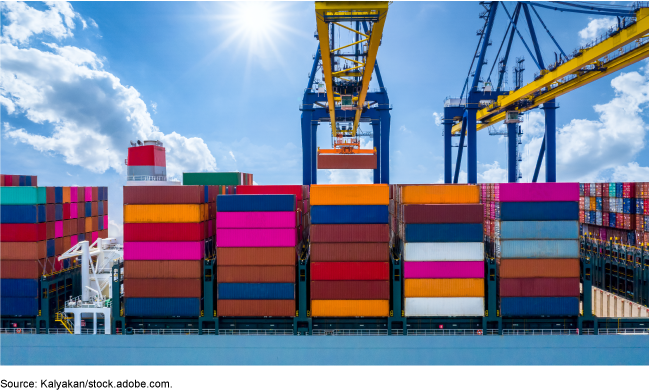Maritime Cargo Security: CBP's Efforts to Address the Impacts of COVID-19
Fast Facts
COVID-19 pandemic restrictions led to changes in some work practices and operational procedures for Customs and Border Protection programs that oversee the security of U.S.-bound cargo.
Most CBP officials began teleworking, which required coordinating with host country officials at overseas ports via email and telephone to request examinations of U.S.-bound cargo shipments.
Travel restrictions also prevented CBP specialists from validating supply chain security procedures in-person—causing backlogs. First-time validations must be done in-person, but CBP is revalidating security procedures via videoconference to reduce backlogs.
The U.S. Economy is Dependent on the Flow of Millions of Tons of Cargo Shipments Each Day

Highlights
What GAO Found
The COVID-19 pandemic impacted two of U.S. Customs and Border Protection's (CBP) key maritime cargo security programs—the Container Security Initiative (CSI) and the Customs Trade Partnership Against Terrorism (CTPAT) program. CSI officers largely work from foreign ports and were subject to COVID-19 lockdown and social distancing requirements that varied by location. Overall, the COVID-19 restrictions led to some changes in work practices and operational procedures. In particular, CSI officers at many CSI ports began to telework in early 2020. The length of time they teleworked varied by CSI location based on local COVID conditions and restrictions. In addition, a number of CSI ports amended operational procedures. This included coordinating examinations of high-risk, U.S.-bound cargo shipments with host country officials via email and telephone rather than in-person. In some instances, CSI relied on CBP staff in the U.S. to conduct the cargo examinations.
CTPAT supply chain security specialists are largely based in domestic field offices, but they were also subject to COVID restrictions that required them to telework during 2020 and 2021. In addition, COVID travel restrictions meant that CTPAT supply chain security specialists—could not conduct such visits in-person from March 2020 to early April 2022. Traditionally, these specialists traveled to conduct in-person validations and periodic revalidations of CTPAT members' supply chain security practices. As a result, the CTPAT program was not able to keep pace with required security validations and revalidations of members' supply chain security practices, which led to backlogs. To address the backlogged security validations, the CTPAT program trained additional staff and prioritized completing security validations dating from 2020 and 2021. To address the backlogged security revalidations, the CTPAT program developed procedures for conducting virtual security revalidations using videoconferencing technology. While these efforts were still ongoing at the time of our review, the CTPAT program had made progress in decreasing the backlogged security validations and revalidations.
Photo of a Vessel Laden with Cargo Containers

Why GAO Did This Study
The U.S. economy is dependent on the flow of millions of tons of cargo each day throughout the global supply chain—goods moving from manufacturers to end users. Cargo shipments can present security concerns, as individuals have used cargo containers to smuggle narcotics, stowaways, and other contraband. Within the federal government, CBP, a component within the Department of Homeland Security, has responsibility for cargo security.
CBP has developed programs that focus resources on identifying U.S.-bound cargo shipments that may be at high risk of transporting terrorist weapons or other contraband and examining those shipments. In addition, CBP provides benefits to CTPAT members that employ cargo security practices that meet CBP's criteria. Such benefits include expedited processing of their U.S.-bound shipments.
The CARES Act includes a provision for GAO to report on monitoring and oversight efforts related to the COVID-19 pandemic. This report addresses how COVID-19 impacted CBP's maritime cargo security programs.
GAO analyzed data on CBP's maritime cargo security mission activities, reviewed relevant policies and procedures, and interviewed CSI and CTPAT officials. GAO also interviewed selected members of the international trade community.
The Department of Homeland Security and CBP reviewed a draft of this report and CBP provided technical comments that have been incorporated into the report, as appropriate.
For more information, contact Heather MacLeod at (202) 512-8777 or MacleodH@gao.gov.
